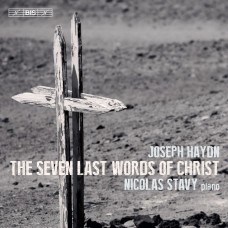|
海頓: 基督最後十架七言
尼可拉.史塔維 鋼琴
錄音地點 法國巴黎聖馬塞爾
Nicolas Stavy, piano
Haydn’s depiction of the final moments of Christ on the Cross, in the version for keyboard
The Seven Last Words of Christrefers to the seven short phrases uttered by Jesus on the cross, as
gathered from the New Testament. Over the centuries the crucifixion has served as inspiration to countless
composers, and settings of these utterances have become something of a subgenre, beginning in the
Renaissance with early motets and continuing into our own time. By way of Cesar Franck and Sofia
Gubaidulina, composers ranging from Heinrich Schutz to Tristan Murailhave contributed versions using
various combinations of voice and/or instruments.
One of the best known of these settings is probably the one by Joseph Haydn. The one –or rather the four: a
rather complicated story begins in 1785, when Haydn received a commission from Cadízin Spain, at the other
end of Europe. He was asked to compose seven slow movements, each ca 10 minutes long, to be played by
an orchestra in alternation with the priest expounding on each of the seven words. Relishing this unusual
challenge, Haydn accepted and ended up so pleased with the result that he immediately made a version for
string quartet as well as authorising another one for keyboard. The work became so popular across Europe
that ten years later the music was used one final time, in an oratorio for choir and orchestra. The work is here
heard in the version for keyboard, performed by the French pianist Nicolas Stavy. He closes the disc with
another unusual work in Haydn’s oeuvre, the Andante con variazioni, Hob. XVII/6, which has been described
as ‘the deepest and most profound set of variations for piano composed between Bach and Beethoven’.
Joseph Haydn (173 2 —1809)
The Seven Last Words of Christ on the Cross 46'54
Hob. X X /1C
1 ) L’Introduzione 5'12
2 ) Sonata I. Pater dimitte illis quia nesciunt quid faciunt 6'03
3 ) Sonata II. Hodie mecum eris in Paradiso 5'49
4 ) Sonata III. Mulier ecce filius tuus 6'18
5 ) Sonata IV. Deus meus, Deus meus, utquid dereliquisti me? 4'57
6 ) Sonata V. Sitio 5'25
7 ) Sonata VI. Consummatum est 5'57
8 ) Sonata VII. In manus tuas, Domine, commendo
spiritum meum 5'03
9 ) Il Terremoto 1'41
10 —13 ) Andante con variazioni in F minor, Hob. XVII/6 15'20
TT: 62'55 |
|



